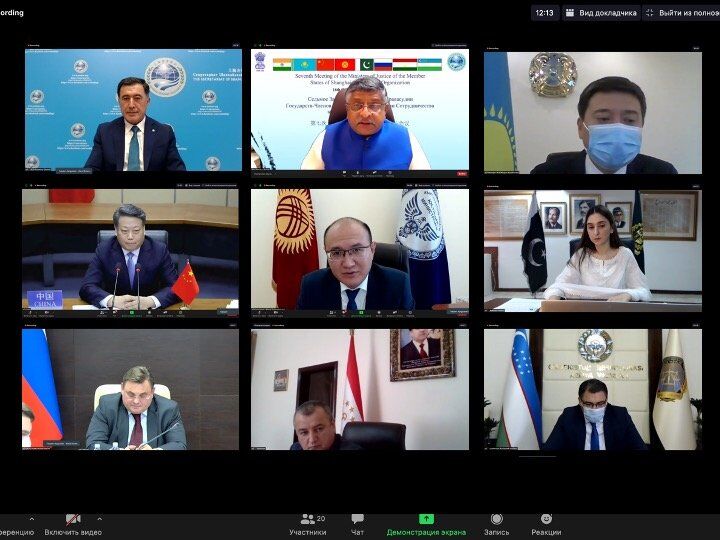SCO Secretary-General Vladimir Norov took part in the 7th Meeting of SCO Justice Ministers held on 16 October 2020.
The virtual meeting was attended by Minister of Law and Justice of the Republic of India Ravi Shankar Prasad, Minister of Justice of the Republic of Kazakhstan Marat Beketayev, Justice Minister of the People's Republic of China Tang Yijun, Justice Minister of the Kyrgyz Republic Marat Dzamankulov, Authorised Representative of the Ministry of Law and Justice of the Islamic Republic of Pakistan Ms Ambreen Abbasi, Ministry of Justice of the Russian Federation Konstantin Chuychenko, Minister of Justice of the Republic of Tajikistan Muzaffar Ashuriyon, Minister of Justice of the Republic of Uzbekistan Ruslanbek Davletov.
The meeting was chaired by Indian Minister of Law and Justice Ravi Shankar Prasad.
During the event, which was held in the traditional atmosphere of openness, friendship and mutual understanding, the participants, working in accordance with the approved agenda, reviewed their ministries' joint efforts to implement the agreements reached at the 6th Meeting of SCO Justice Ministers held in Bishkek.
SCO Secretary-General Vladimir Norov updated the ministers on the SCO Secretariat's activities during the COVID-19 pandemic and the preparations for the SCO Heads of State Council meeting scheduled to take place via videoconference in November. He emphasised the importance and relevance of the justice ministers' agenda in the context of the upcoming summit meeting.
Vladimir Norov noted the justice ministries' huge contribution to the further development of the SCO legal framework and the attainment of the goals set forth in the SCO Charter, the SCO Development Strategy until 2025 and the Agreement on Cooperation between the Ministries of Justice of the SCO Member States.
The SCO Secretary-General pointed out the importance of legal regulation of the exchange of information about infectious diseases in the SCO space and the cross-border movement of people and cargo in emergency conditions. Conversion to online interaction amid the pandemic has highlighted a number of practical legal problems in the SCO member states, such as the implementation of contracts in force majeure conditions, bankruptcy procedures, preserving jobs, supporting small and medium-sized businesses, and protecting copyright and the rights of consumers.
Vladimir Norov proposed analysing the legal framework of the SCO and coordinating proposals aimed at its improvement, the creation of a favourable investment environment, as well as the further development of the transport infrastructure and agriculture in the SCO space. He noted that over 1,400 laws and regulations had been adopted within the SCO over a period of nearly 20 years since the organisation's establishment.
However, a new legal framework should be coordinated for the implementation of the Programme of Multilateral Trade and Economic Cooperation of the SCO Member States until 2035 in light of the negative consequences of the pandemic.
Touching upon food security, the Secretary-General mentioned the importance of formulating legal regulations on standardising the SCO member states' sanitary and phytosanitary norms and standards, as well as lowering certification and customs barriers. The SCO states' agricultural sectors, which make up a huge consumer and export market with great potential and capabilities, can ensure their own food security and also contribute to this issue on the international stage.
Vladimir Norov also called for the creation of a solid legal framework for promoting the development of multilateral cooperation aimed at expanding the transport and communication facilities in the region. There are over 300,000 kilometres of railway lines in the SCO space, but there are no agreements on the cooperative use of this mode of transport, the importance of which for the timely delivery of cargo has grown many times over during the pandemic.
The SCO Secretary-General said that e-commerce cooperation in the SCO space should be stimulated through the coordination of joint legal norms in the fields of e-commerce and the protection of consumers' and providers' rights. The efficiency of information technology has been proved by a rapid conversion of a large part of business activities and the vital government and education services online during the COVID-19 pandemic. As of now, 1.5 billion users are making their purchases online, and e-commerce accounts for some 20 percent of global trade. Its share is forecast to grow to 25 percent by 2025.
Wrapping up their meeting, the ministers of law and justice pointed out the importance of maintaining a regular dialogue and implementing the agreements reached.
They expressed appreciation to the Indian Ministry of Law and Justice for the well-organised event and for creating comfortable working conditions for them.
The next meeting of the SCO Justice Ministers is to be held in 2021 in the Republic of Tajikistan.
